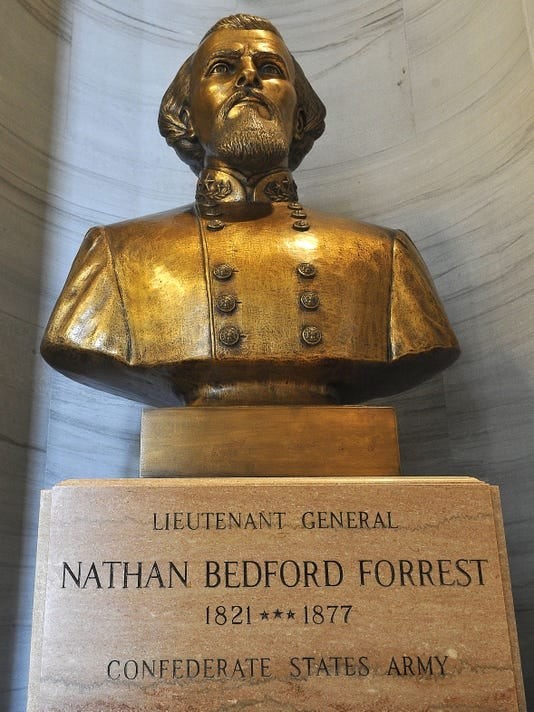 Nathan Bedford Forrest Boyhood Home/Facebook
Nathan Bedford Forrest Boyhood Home/Facebook
Fiery debate sparked among members and guests of the Tennessee House Naming, Designating, and Private Acts committee Tuesday as they reviewed the possible removal of a bust of Nathan Bedford Forrest from the State Capitol Building.
Rep. Rick Staples (D-Knoxville) brought a resolution to the committee to remove the bust, “replacing it with tribute to a more deserving Tennessean.” Staples suggested replacing it with busts of Anne Davis, a Knoxville woman instrumental in winning federal designation for Smokey Mountains National Park, and of William Yardley, the first African American to run for Tennessee governor.
“There are a number of divisive topics on the Nathan Bedford Forrest bust,” Staples said. “My idea is to move past the conversations that divide us and have conversations about what could bring us together.”
Kristie Allen, general counsel for the Tennessee Capitol Commission, laid out the two-step process for the bust’s removal. The removal would first go to the Capitol Commission, a board comprised of several cabinet members, like the Secretary of State, comptroller, and Commissioner of Finance, for example.
If that board approves of the removal, it would, then, request a waiver from the Tennessee Historical Commission to step around the Tennessee Heritage Protection Act. That law says no statue or monument can be removed from public grounds without the commission’s approval. Memphis sidestepped this process in 2017 and removed the statue of Forrest from what is now called Health Sciences Park.
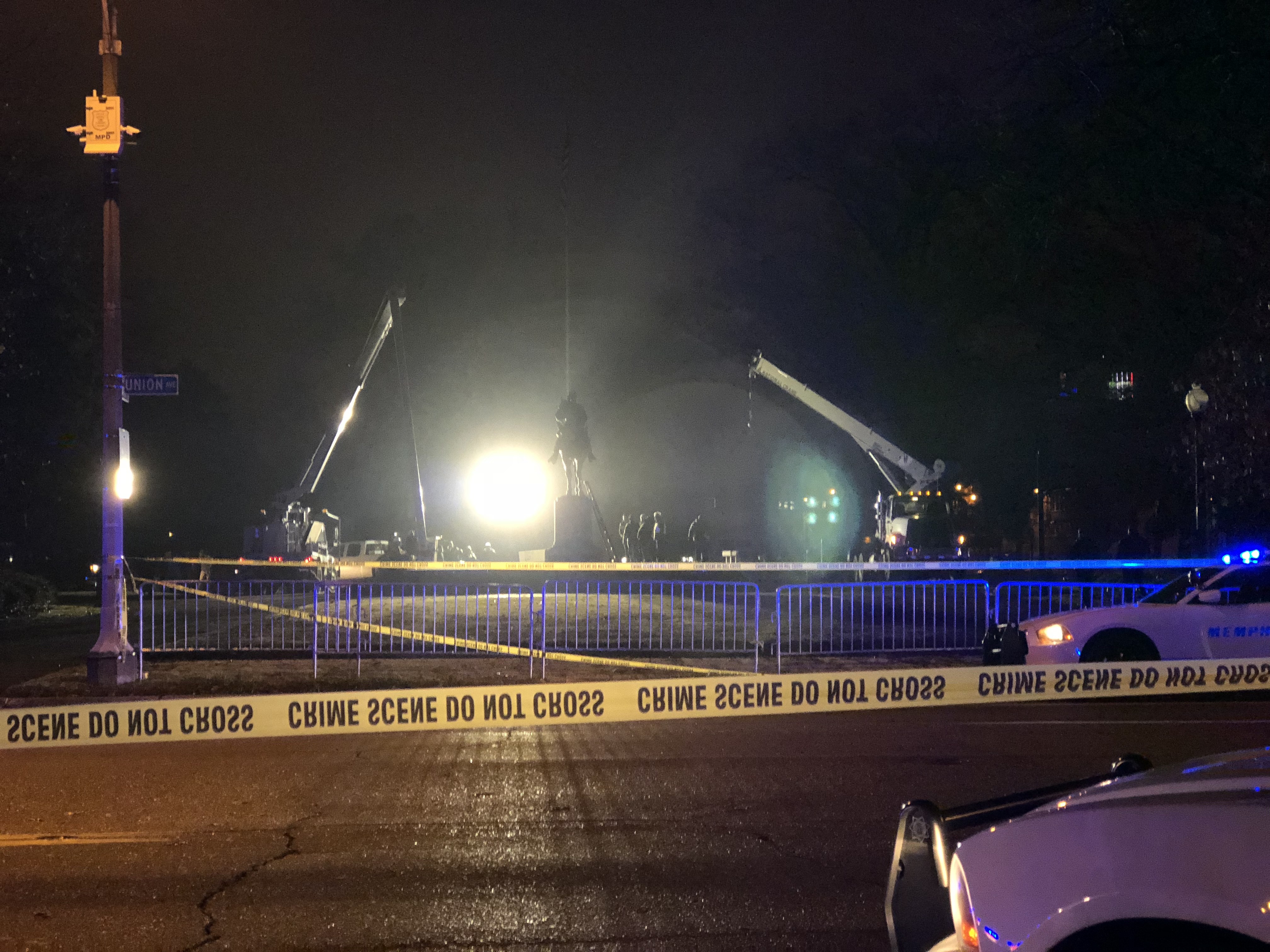
Minutes before Nathan Bedford Forrest’s statue was removed from Health Sciences Park
Staples’ resolution would not change much substantively. It would simply tell members of the deciding bodies of the House’s opinion on the bust and, perhaps, inform their decisions.
Rep. Mark Windle (D- Livingston) chaired the meeting Tuesday and noted that he asked members of the Tennessee Historical Commission to attend but “they declined to appear. They were invited and decided not to come.”
[pullquote-1] Without the board’s historical expertise, the committee heard, instead, from James Patterson, a Civil War re-enactor and state commander of the Sons of Confederate Veterans. The Forrest bust should stay, he said, to help us remember the history of our past.”
“Monuments have not been a problem until about three years ago,” Patterson said. “(Attacks on the monuments) are now based on a false narrative and fake history, agitated by those with a radical agenda about the destruction of American history.”
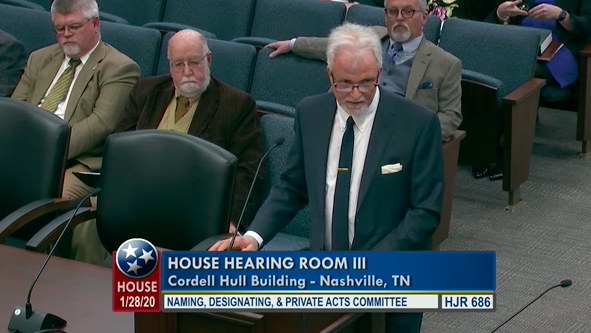
Sons of Confederate Veterans state commander testifies to the House committee.
Patterson said members of the “Murfreesboro antifa” recently “doxxed” him, and made his personal information like his home address, phone number, and more public. The group called him and others “white supremacists” and it seemed some were trying “to get someone to attack us just because we like Tennessee history because it comes in through our blood.” Also, he recently received a letter saying, “leave town racist.” He said removing the bust would be “approving their bad behavior.”
Rep. John Ray Clemmons (D-Nashville) said protests around the Forrest bust go back to at least 1978 and have continued since then. Patterson said those protests probably weren’t as rowdy as they have been recently. Clemmons said bullwhips were used and that there have been “overwhelming objection to the bust since 1978.”
The committee also heard from historian and former history professor Michael Bradley, who urged the committee to “apply the standard practices of history to the issues at hand.” That meant looking at evidence and proof.
In several instances, Bradley provided several accounts of where, he said, legend about Forrest had overshadowed facts. While Forrest was a slave trader, Bradley said a news story at the time that painted him as an abusive slave owner was likely “wartime propaganda” conceived by Abraham Lincoln’s administration.
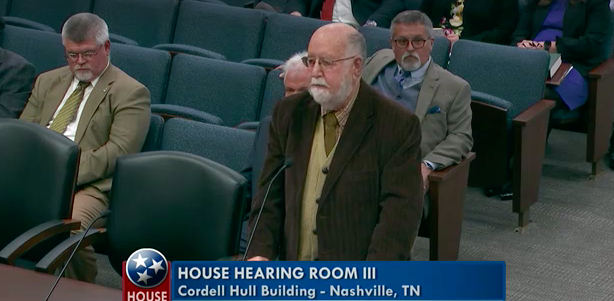
Michael Bradley testifies to the House committee.
On founding the Ku Klux Klan, Bradley said no one has ever produced evidence that Forrest formed the group. He said a federal inquiry proved this and that legislators at the time “congratulated him on his efforts to suppress the Klan.”
On Fort Pillow, Bradley said there were some violations of the rules of war. However, he said the numbers were exaggerated. The midpoint of casualties, Bradley said, was about 185, not the 277 listed in state historical documents or in encyclopedias.
On this discrepancy, Rep. Jason Hodges (D-Clarksville) asked “how many people can you massacre and still be honored?” Bradley told him massacre was a “loaded” word and recalled that many called Forrest “the Butcher of Fort Pillow.”
“Oh, OK. How many people can I butcher before I’m honored by the state of Tennessee?” Hodges asked.
Bradley replied, “probably a large number” and pointed to Andrew Jackson’s removal and slaughter of Native Americans.
While many committee members debated Forrest’s merit and place of honor in the capitol building, Rep. Bo Mitchell (D-Nashville) was having none of it.
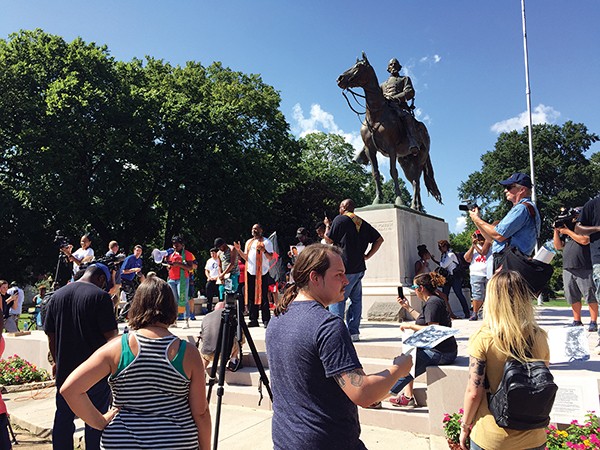
Crowds gathered in Health Sciences Park to support the removal of the Nathan Bedford Forrest statue.
“I don’t want to honor anyone in this state that is guilty of something like,” Mitchell said. “Take me to Germany and show me anyone responsible for the atrocities of World War II and if there’s a state of them in Germany honoring them, I’ll shut up and say we should leave that bust up,” Mitchell said. “Things were done wrong in our history and we need to learn from them and move on, but let’s not act like nothing happened at Fort Pillow.”
The committee ultimately held the resolution for one week. Rep. Glen Casada (R-Franklin) said he had an amendment to the legislation that rotates busts of Tennesseans in and out of the capitol building. At the end of Tuesday’s debate, though, Staples had the last word.
“It is serendipitous and a thing of beauty that after such a hearty and controversial debate, that a descendant of slavery is now speaking,” Staples said. “An individual who was never thought to be here today, walked across the assembly floor of the House.
“(Tennsseans) are seeing us fight and be divisive and debate. I’m telling you today, this is not who we are. I know you. You know me. We know our families. We laugh. We talk. We make fun of one another. We know how to be respectful of one another.”
[pullquote-2] At the same committee meeting, Staples offered the committee a bill to designate August 8th as “Emancipation Day.“ The bill would would change the day from one of observance to a legal holiday. The distinction would allow some state employees to take the day off from work.
This, according to the legislature’s fiscal review committee, could cost the state up to $647,400 in the next fiscal year and each year afterward.
Staples said he’ll amend the bill to designate the day to the first Sunday before August 8th, removing any financial hit to the state budget.